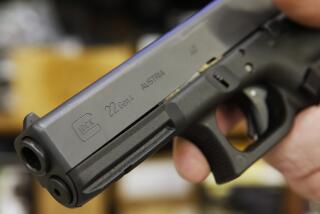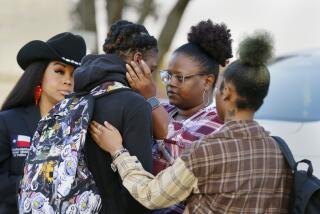Holding a Knife Too Long Gets Stanton 5th-Grader in Trouble
- Share via
No one disputes that fifth-grader Keith Post was right to turn in the pocketknife he found Monday.
What is being called into question is the two hours Keith took to turn it in to his teacher after finding it in the cafeteria of his Stanton elementary school -- and whether that delay is just cause for the boy to be suspended under the district’s zero-tolerance weapons policy.
Although Keith’s five-day suspension from Pyles Elementary was reduced Tuesday to one day, he and his parents say that being punished at all for doing the right thing is unacceptable.
Administrators said they have no wiggle room in enforcing the Magnolia School District’s zero-tolerance policy. The rules state that any child who has a weapon at school is to be automatically suspended for five days and a hearing held at the school.
Pyles Principal Rick Johnson said the policy, which is invoked about five times a year at his school, is intended to create a safe environment for students. He said Keith’s spotless discipline record and the circumstances of the situation “look positive,” but added that the 10-year-old deserves some punishment for not turning over the knife immediately.
“He did the right thing in turning it in,” Johnson said. “Where he went wrong is holding onto it for a long length of time. He had the opportunity to turn it in and didn’t.”
Officials do have leeway once the disciplinary process has started, Johnson said, such as being able to shorten the suspension, as they did with Keith.
At Keith’s hearing this afternoon, his father said he will insist the incident be stricken from the boy’s permanent record and that officials apologize for punishing him. Anything less is unfair, Brady Post said.
“The law is written and intended for those who get caught with a weapon,” said Post, a construction foreman. “Keith turned it in. He deserves to be made into an example of good behavior, not to be punished.”
Keith said he is baffled and angry about what happened. Despite the consequences, he doesn’t regret turning over the knife or telling the truth about holding onto it for two hours.
“It was the right thing to do,” he said. “I can’t let myself do bad things.”
Keith, who has three teenage sisters, has earned several citizenship awards at Pyles, the most recent in January. Being good, he said, is how he plans to earn college-worthy grades and become an architect -- ideally after quarterbacking for the Denver Broncos.
“You have to be good to get scholarships,” Keith said. “It kind of makes me sad that maybe people at school don’t think I’m good anymore.”
According to Keith, while having lunch in the cafeteria Monday, one of his friends discovered the 2-inch-long Swiss Army-style knife and asked Keith to hold it.
Keith said he waited two hours before turning it in because he was scared and thought his teacher might believe the knife belonged to him.
Keith had never before been sent to the office for being in trouble in his years at Pyles, the principal confirmed. Keith said that once or twice in first grade he had to stand by a pole at recess because he didn’t do his homework.
The case is another in the contentious debate over zero-tolerance policies. Other incidents that have drawn fire from groups that oppose the policies include a 10-year-old Colorado girl who was expelled after accidentally bringing her mother’s bread knife to school and then turning it over, and a 12-year-old boy expelled from a Corona school for possessing fingernail clippers. Both expulsions were overturned.
The policies became popular after the federal government in 1994 mandated that all schools receiving federal funds must expel any student who brings a firearm to campus. California also requires schools to expel students caught dealing drugs or brandishing knives.
The incident reflects a lack of common sense in schools’ approaches to preventing violence, said Marsha Levick, legal director of the Juvenile Law Center in Philadelphia, which opposes all zero-tolerance policies.
“Certainly all of us oppose having weapons at school,” she said. “But schools need the opportunity to exercise discretion from the beginning, not midway through the process.”
School officials need to consider how children will interpret such incidents. Rather than understanding that Keith got in trouble for keeping the knife too long, children will see only that he was punished for turning it in, Levick said.
“Children won’t appreciate the difference,” she said.
Keith’s principal disagreed.
“Kids understand what it means to do something immediately,” Johnson said. “I hope what they get out of all this is that the school truly cares about their safety.”
More to Read
Sign up for Essential California
The most important California stories and recommendations in your inbox every morning.
You may occasionally receive promotional content from the Los Angeles Times.













